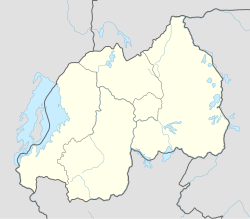
Rwanda, officially the Republic of Rwanda, is a landlocked country in the Great Rift Valley, where the African Great Lakes region and East Africa converge. Located a few degrees south of the Equator, Rwanda is bordered by Uganda, Tanzania, Burundi, and the Democratic Republic of the Congo. It is highly elevated, giving it the soubriquet "land of a thousand hills", with its geography dominated by mountains in the west and savanna to the east, with numerous lakes throughout the country. The climate is temperate to subtropical, with two rainy seasons and two dry seasons each year. Rwanda has a population of over 12.6 million living on 26,338 km2 (10,169 sq mi) of land, and is the most densely populated mainland African country; among countries larger than 10,000 km2, it is the fifth most densely populated country in the world. A million people live in the capital and largest city Kigali.

The economy of Rwanda has undergone rapid industrialisation due to a successful governmental policy. Since the early-2000s, Rwanda has witnessed an economic boom, which improved the living standards of many Rwandans. The Government's progressive visions have been the catalyst for the fast transforming economy. The President of Rwanda, Paul Kagame, has noted his ambition to make Rwanda the "Singapore of Africa".
Telecommunications in Rwanda include radio, television, fixed and mobile telephones, and the Internet.

Kigali is the capital and largest city of Rwanda. It is near the nation's geographic centre in a region of rolling hills, with a series of valleys and ridges joined by steep slopes. The city has been Rwanda's economic, cultural, and transport hub since it became the capital following independence from Belgian rule in 1962.

Education in Rwanda has undergone considerable changes throughout Rwanda's recent history, and has faced major disruptions due to periods of conflict. Despite improvements to education and literacy as part of the country's rebuilding after the 1994 genocide, the education system still faces challenges including low school enrolment rates and limited resources. The education system is overseen by the Ministry of Education.
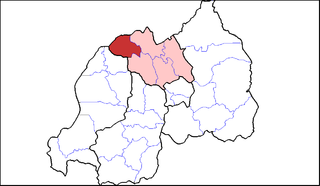
Musanze is a district in the Northern Province of Rwanda. Its capital city is Ruhengeri, Musanze is the fourth largest town in Rwanda and is quickly growing into a bustling metropolis. Musanze district is one of thirty districts in all of Rwanda and one of five districts in the Northern Province.

Huye is one of the eight districts (Akarere) that make up Rwanda's Southern Province. It has a total surface area of 581.5 square Kilometers. It has thirteen sectors and 77 cells with a total of 508 umudugudus (villages) in total. The district has a population of 328,298, with an average of 581 inhabitants per square kilometer. The largest city in the province is Butare.
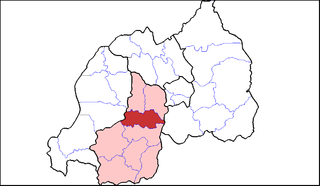
Ruhango is a district (akarere) in Southern Province, Rwanda. Its capital is Ruhango town, a large settlement on the road between Gitarama and Butare.

Gasabo is a district, (akarere) in Kigali city, the capital of Rwanda. The headquarter of Gasabo is located in kimironko Sector. The district also includes large areas of the city itself, including Kacyiru, Remera, Nyarutarama and Kimihurura.

Kicukiro District is one of the three Districts which constitute the City of Kigali and is situated in the South-East of the City of Kigali. Is a district (akarere) located in Kigali Province, Rwanda. Kicukiro is home to a thriving market, a number of NGOs and the Bralirwa Brewery. In addition, it is the headquarters for the Friends Church in Rwanda. Kicukiro District is also home to two major memorial sites associated with the Rwandan genocide. These are the Rebero Genocide Memorial Site where 14,400 victims are buried, and the Nyanza Genocide Memorial Site where 5,000 victims were killed after Belgian soldiers who were serving in the United Nations peacekeeping forces abandoned them.

Rubavu District is one of the seven districts of the country district (akarere) in Western Province, Rwanda. Its capital is Gisenyi, It has a large beach resort and border city. It has a total surface area of 388.3 Km2.
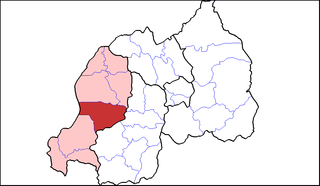
Karongi is a district (akarere) in Western Province, Rwanda. Its capital is Rubengera, but the district also contains Kibuye, Rwanda, the provincial capital and a major Rwandan lakeside resort.

Rutsiro is a district (akarere) in Western Province, Rwanda. Its headquarter is located in Gihango sector.

Water supply and sanitation in Rwanda is characterized by a clear government policy and significant donor support. In response to poor sustainability of rural water systems and poor service quality, in 2002 local government in the Northern Byumba Province contracted out service provision to the local private sector in a form of public–private partnership. Support for public-private partnerships became a government policy in 2004 and locally initiated public-private partnerships spread rapidly, covering 25% of rural water systems as of 2007.
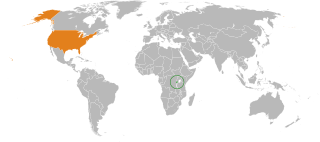
Rwanda–United States relations are bilateral relations between Rwanda and the United States.

Rwanda faces a generalized epidemic, with an HIV prevalence rate of 3.1 percent among adults ages 15 to 49. The prevalence rate has remained relatively stable, with an overall decline since the late 1990s, partly due to improved HIV surveillance methodology. In general, HIV prevalence is higher in urban areas than in rural areas, and women are at higher risk of HIV infection than men. Young women ages 15 to 24 are twice as likely to be infected with HIV as young men in the same age group. Populations at higher risk of HIV infection include people in prostitution and men attending clinics for sexually transmitted infections.

The culture of Rwanda is varied. Unlike many other countries in Africa, Rwanda has been a unified state since precolonial times, populated by the Banyarwanda people who share a single language and cultural heritage. Eleven regular national holidays are observed throughout the year, with others occasionally inserted by the government.
In the African Great Lakes region, the clan is a unit of social organisation. It is the oldest societal structure in the region, other than family and direct lineage. The structure is found in modern-day Rwanda, Burundi, Tanzania and Uganda.
John Ruganda was Uganda's best known playwright. Beyond his work as a playwright, Ruganda was also a professor at University of North, South Africa, University of Nairobi, and Makerere University.

In the year 2000, Rwanda engaged in a decentralization process materialized by the adoption of the National Decentralization Policy. The policy's objective were the promotion of good governance, the reduction of poverty as well as the promotion of efficient, effective, and accountable service delivery.
